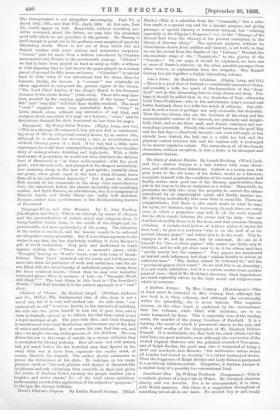The Story of Andrew Fairfax. By Joseph Hocking. (Ward, Lock,
and Co.)—Andrew Fairfax is a tale written with some clever- ness, and with excellent intentions. Andrew is a young man who goes down to the old home of his father, works as a labourer, acquaints himself with the condition of the rural populations, and finally, makes such good use of the literary opportunities thus put in his way as to rise to eminence as a writer. Meanwhile, he persuades the lady who owns the property to correct the abuses introduced by an unprincipled agent, and finally marries her. Mr. Hocking undoubtedly hits some blots in rural life. There are exaggerations ; but there is also much truth in what he says. An agent, for instance, may be necessary, though there aro many eases in which a proprietor may well do all the work himself. But he often stands between the owner and his duty. One un- doubted absurdity there is in the book, and that concerns literary criticism. A certain rival in love of Andrew wishes to injure his first book ; he goes to a reviewer "who is on the staff of an im- portant literary paper," and bribes him to do the work. This he engages to do, not by abuse, but by contempt. He can do it himself for "two or three papers" (the names are fairly easy to identify), and he will get other men to do it for others, and thus "pretty nearly box the compass." Two papers are mentioned as beyond such influences, but they "seldom trouble to review an unknown man." "The dailies cannot be reckoned on," and the " provincial papers don't count." As we said, this is an absurdity ; it is not worth refutation ; but it is a serious matter from another point of view,—that of Mr. Hooking's character. Such imputations are made especially odious by the high moral and religious tone which he assumes.


































 Previous page
Previous page